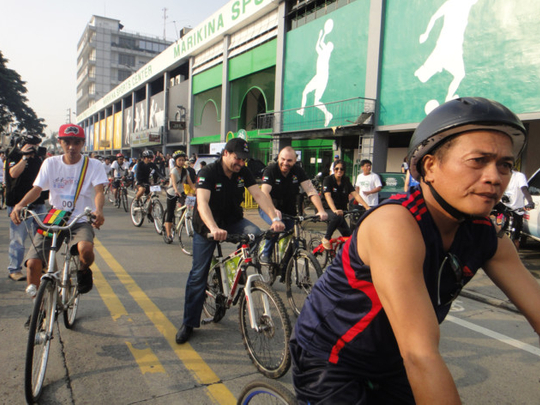
Manila: Every hour, 24 babies are born to teenage girls in the Philippines. These unplanned pregnancies push them to drop out from school, often robbing them of their chances for a better future.
To mark International Day of the Girl Child on Saturday, philanthropic organisation Dubai Cares travelled to the Philippines with the aim to turn the young girls’ situation around by urging them to go to school and encouraging them to complete their education.
Dubai Cares, with its implementing partner, Plan International, also launched on Friday the Real Assets through Improved Skills and Education for Adolescent Girls (Raise) Philippines to help uplift girls’ lives through education so they can make better and informed choices for their future.
Commenting on the Dubai Cares programme, the UAE Ambassador to the Philippines, Musa Abdul Wahid Al Khajah said: “The continuous humanitarian efforts of the United Arab Emirates abroad are testament to the generosity of its people and leadership. Dubai Cares work in the Philippines represents a portion of the support that the UAE extends to countries in need, making a positive impact on the overall growth and potential of developing nations.”
“For any nation to develop to its full potential, enforcing gender equality should be more than an ideal; it should be on top of the national development agenda,” Tariq Al Gurg, Dubai Cares CEO, said.
“The large discrepancies we see in education and economic participation, between girls and boys, are detrimental to development and productivity for all as it handicaps a significant percentage of the population,” he added.
Dubai Cares has committed to support the education and other social needs of 10,976 marginalised children and youth, 70 per cent of whom are girls, in two of the Philippines’ poorest provinces, Masbate and northern Samar.
The programme will also capacitate 3,724 adults, mostly parents, guardians, and teachers, to provide a home and school environment conducive to learning so children won’t have to leave school.
The four-year project was unveiled in July 2013 and will run until April 2017. Dubai Cares pledged a support of $2 million (Dh7.3 million) and its partner Plan International will also give $300,000 to carry out a comprehensive and customised strategy to combat the problem.
“Twenty-four babies born to teenage mothers in an hour are too many in my opinion. I’m a mother of two teenage girls and so it breaks my heart because we know that as soon as a mother has a child, she is at risk of dropping out of school immediately,” Carin van der Hor, Country Director of Plan Philippines, told Gulf News.
“It’s a shocking number. It’s a number we need to talk about and we can prevent it from happening by comprehensive education and comprehensive sexuality education.”
Teenage pregnancies are one of the common causes of school dropout not only in the Philippines but also globally. According to a 2013 UN report ‘Motherhood in Childhood’, about 19 per cent of teenagers in developing countries become pregnant before they reach 18. Some 20,000 teenagers give birth every day globally.
One out of every eight Filipinos between six and 24 years old is an out-of-school-youth according to figures from the Philippine Statistics Authority released in 2011. The report also said that the proportion of out-of-school youth is much higher among girls.
Rogelio Dones, Senior Education Specialist at the Department of Education, said that many other factors push children to leave school apart from unplanned teenage pregnancies. He clarified that there is no institutionalised discrimination between girls and boys’ access to education in the Philippines. The main barriers are poverty and distance from the school to the children’s homes. In cases of families in rural areas, girls often put their education in the back seat to help in the family.
Al Gurg said he hopes Dubai Cares’ programme for girls’ education and gender equality would provide an impetus for the Philippine government to put girls’ rights high up in the national agenda and scale it up by increasing its funding for education in the country.












